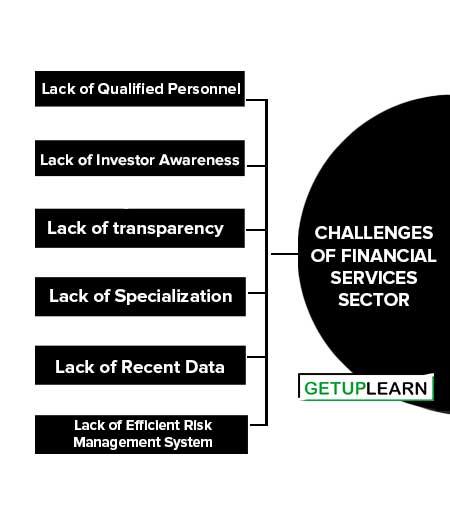Table of Contents
What is Financial System?
A “financial system” is a system that allows the exchange of funds between lenders, investors, and borrowers. Financial systems operate at national and global levels.
They consist of complex, closely related services, markets, and institutions intended to provide an efficient and regular linkage between investors and depositors.
Money, credit, and finance are used as a medium of exchange in financial systems. They serve as a medium of known value for which goods and services can be exchanged as an alternative to bartering.
A modern financial system may include banks (public sector or private sector), financial markets, financial instruments, and financial services. Financial systems allow funds to be allocated, invested, or moved between economic sectors. They enable individuals and companies to share the associated risks.
What is Financial Services Sector?
The financial services sector is a category within the economic system that provides a wide array of businesses with financial products and services. These are essential in facilitating economic activities and transactions, creating, liquidating, or changing ownership of financial assets, and managing risk.
The financial services sector consists of banking services, investment services, insurance services, real estate services, and insurance, all of which provide different financial services to people and corporations.
Since 1990, there’s been a significant rise in financial services offered by different banks and financial institutions. The quality and diversity of services, provided by both banking and non-banking companies, dictate the efficacy of this burgeoning financial system.
The system, composed of institutions, markets, and financial instruments, caters to the needs of individuals, businesses, and organizations, enabling smooth financial operations. Essentially, the quality and breadth of the financial services underpin the orderly function of the financial system.
In India, the service sector, contributing to nearly 57% of the GDP, has significantly bolstered the economy, with the financial services segment playing a pivotal role. Commercial banks, holding over 60% of total assets, dominate the Indian financial services sector. Other contributors include mutual funds, insurance companies, non-banking institutions, cooperatives, and pension funds.
The Indian government has implemented reforms to liberalize, regulate, and improve the nation’s financial services industry, turning India into one of the world’s most dynamic capital markets. Despite existing challenges, the sector’s future prospects appear promising.
The present situation of the Indian financial service sector could be broadly represented as follows:
- RBI, at the Apex
- Commercial banks which include public sector and private sector Banks.
- Development financial institutions could be divided into all Indian institutions and state-level institutions.
- Insurance companies can be classified as, Life Insurance Corporation of India, General Insurance Corporation of India, and private sector insurance companies.
- Other public sector financial institutions like Post Office Savings Bank, National housing bank, Export-Import Bank of India, etc.
- Mutual funds.
- Non-Banking Finance Corporations.
- Asset reconstruction companies,
- Capital market intermediaries.
- Credit information companies.
Challenges of Financial Services Sector
However, the financial service sector has to face many challenges in its attempt to fulfill the ever-growing financial demands of the economy. Some of the important challenges of financial services sector are reported hereunder:
- Lack of Qualified Personnel
- Lack of Investor Awareness
- Lack of transparency
- Lack of Specialization
- Lack of Recent Data
- Lack of Efficient Risk Management System

Lack of Qualified Personnel
The financial services sector is fully geared to the task of “financial creativity”. However, this sector has to face many challenges.
In fact, the dearth of qualified and trained personnel is an important impediment to its growth. Hence, it is very vital that proper and comprehensive training must be given to the various financial intermediaries.
Lack of Investor Awareness
The introduction of new financial products and instruments will be of no use unless the investor is aware of the advantages and uses of the new and innovative products and instruments.
Hence, financial intermediaries should educate prospective investors/users on the advantages of innovative instruments through literature, seminars, workshops, advertisements, and even audio-visual aids.
Lack of transparency
The whole financial system is undergoing a phenomenal change in accordance with the requirements of the national and global environments. It is high time that this sector gave up its orthodox attitude of keeping accounts in a highly secret manner.
Hence, this sector should opt for better levels of transparency. In other words, the disclosure requirements and the accounting practices have to be in line with international standards.
Lack of Specialization
In the Indian scene, each financial intermediary seems to deal with different financial service lines without specializing in one or two areas. In other words, each intermediary is acting as a financial supermarket delivering so many financial products and dealing in different varieties of instruments.
In other countries, financial intermediaries like Newtons, Solomon Brothers, etc. specialize in one or two areas only. This helps them to achieve high levels of efficiency and excellence. Hence, in India also financial intermediaries can go for specialization.
Lack of Recent Data
Most of the intermediaries do not spend more on research. It is very vital that one should build up a proper database on the basis of which one could embark upon “financial creativity”.
Moreover, a proper database would keep one abreast of the recent developments in other parts of the whole world, and above all, it would enable the fund managers to take sound financial decisions.
Lack of Efficient Risk Management System
With the opening of the economy to multinationals and the exposure of Indian companies to international competition, much importance is given to foreign portfolio flows. It involves the utilization of multi-currency transactions which exposes the client to exchange rate risk, interest rate risk, and economic and political risk.
Unless a proper risk management system is developed by the financial intermediaries as in the West, they would not be in a position to fulfill the growing requirements of their customers. Hence, it is absolutely essential that they should introduce Futures, Options, Swaps, and other derivative products which are necessary for an efficient risk management system.
The above challenges are likely to increase in number with the growing requirements of the customers. The financial services sector should rise up to the occasion to meet these challenges by adopting new instruments and innovative means of financing so that it could play a very dynamic role in the economy.
FAQs About the Financial Services Sector
What are the challenges of financial services sector?
The following are the challenges of the financial services sector:
1. Lack of Qualified Personnel
2. Lack of Investor Awareness
3. Lack of transparency
4. Lack of Specialization
5. Lack of Recent Data
6. Lack of Efficient Risk Management System.



